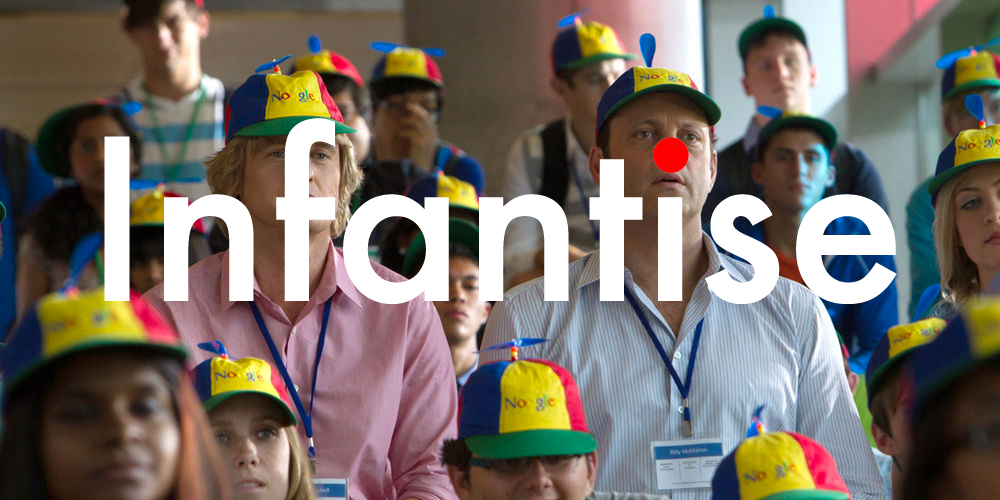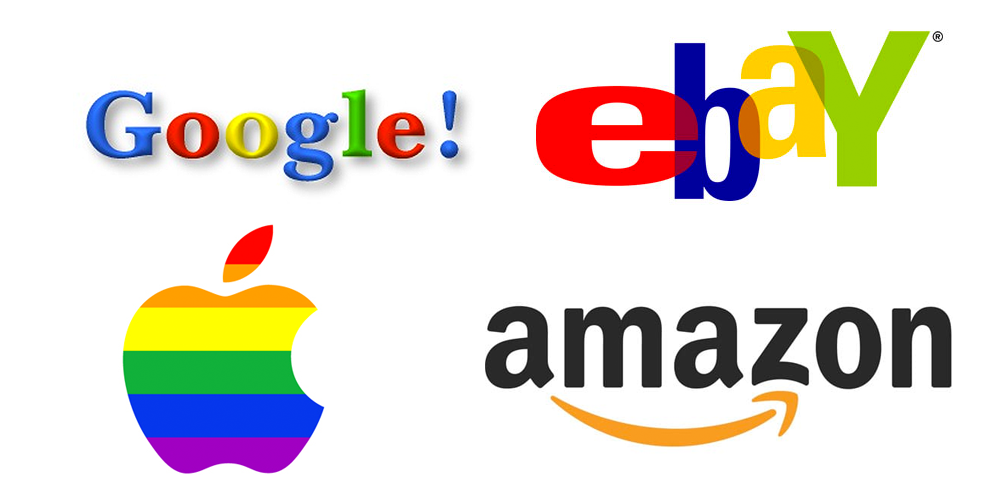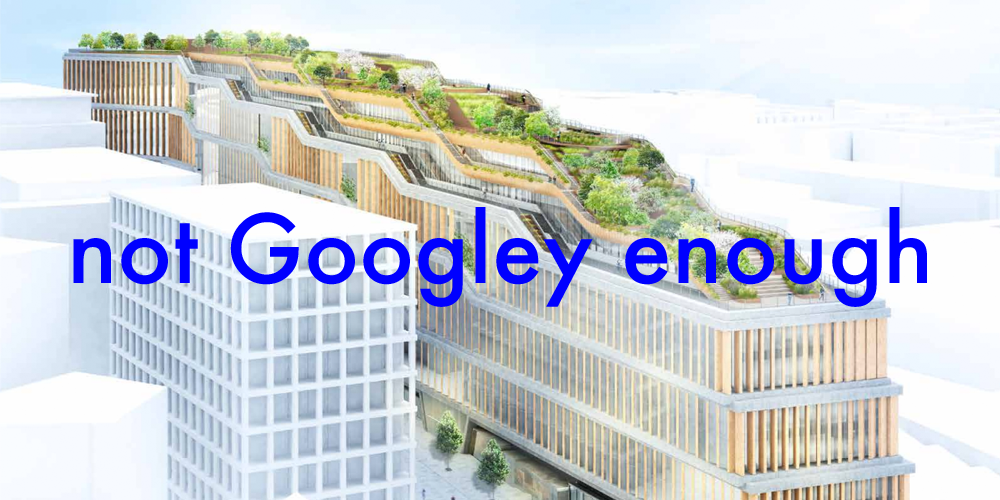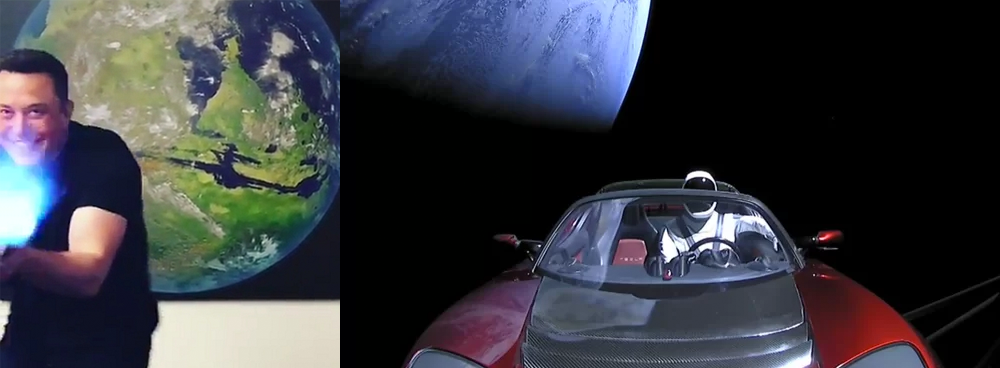Home
Is the ethos of Silicon Valley leading us towards enlightened progress, or infantile servitude?

Infantise
verb - To treat someone as if that person were a child, with the result that they start behaving like one.
Upon a recently visit to Google's temporary London headquarters I was signed in and directed to 'go chill' in 'Hunky Dory' alongside a small flock of new 'Googlers' awaiting to be 'onboarded'. Surrounding me was a building now famed for Harry Potter themed rooms, nap pods, food and drink goodie bars and improvised post-it-note murals of cartoon monsters on the windows. I don't want to come across as a killjoy but I was left with a distinct feeling of when, and how, did the one of the world's biggest organisations become a multi-million pound corporate-creche?
The answers to this question might well provide insight and analogy into the current socio-techno behaviours and ideologies that not only govern the Emperors of Silicon Valley and their associated colonies, but also increasingly dictate the norms and consensus of society at large.

The story begins with an infantised visual aesthetic that quickly became the new normal within the Silicon Valley led technology sector, simultaneously reflecting Californian optimism and outwardly rejecting the corporate visual language of technology as then defined by Microsoft and IBM. Looking back upon the logos of the world's biggest tech corporations they now look to have more in common with a play school than a business looking to have their aspirations for world domination taken seriously. With hindsight, however, 'infantasing' as an ideological strategy, can arguably be seen to be as much of the reason for success as innovation in the physical technology and the platforms they were built upon.
Like a toddler on their first day of play school infantilisation systematically disempowers us from the observation of critical scepticism by distracting us with made up words, bright colours, highly questionable kerning, smileys and a cutesy simplicity.
Two decades later and not only has this infantised aesthetic resided but the infantising mentality has now come to dominate mainstream social environments and behaviours. Our offices have been astroturfed, our meeting rooms renamed from 'B12' to 'The Batcave', hammocks and bean bags have replaced the desk and chair, table tennis and foosball sales have quadrupled, mission statements, values and visions are posted on walls like signposts at a family theme park and performance reviews play the role of the end of term report with peer-to-peer input replacing the happy/disappointed parental validation. And this isn't even to mention the influence infantilisation has had on modern politics with our newly established need to have complex messages delivered in 'headlines', complex and compound systemic issues reduced to a lists of three easy to digest points, and the use of rhyme as a proven vehicle for sing-a-long collective coercion (see 'make' and 'great').
Infantilisation isn't just limited to aesthetics and rhetoric, it has gone on to populate our shared language and mental models. The use of technological terms like 'cookies', 'the cloud', 'I agree' and 'smart' provide comforting metaphorical veneers for some of the most concerning components of surveillance capitalism. A cookie alludes to a baked treat rather than its actuality of a covert tracking devices hiding in plain sight of a default acceptance of the web's social contract.
Within the workplace infantising also serves the darker purpose of keeping memento highly positive, the desire to leave the physical environment of the workplace low, and ultimately control organised criticism via unionisation so that it is accepted as either unneeded or antisocial. Slovenian philosopher Slavoj Žižek identifies the modern cult of the over-familiar boss in jeans as "a dangerous form of totalitarianism". Back when our top-hatted boss arrived in a Rolls Royce to be ushered into the upper meeting rooms of factories it was easy to despise of them, and in turn effectively organise against their inevitable abuse of power via workers unions. Now it would be widely regarded as socially unacceptable to question the inherent profiteering motives of our CEO's and founders, for they sit next to us, say hello to us by name in the morning, provide us with limitless cerial and fruit bowls, and have gone out of their way to clarify our purpose in life. We've just traded solidarity and collective empowerment for a free bowl of Coco-Pops in the morning. The united have been divided.
Like all corporate cultures and management techniques the infantilisation project simply serves the pragmatic purpose of driving productivity up and dissatisfaction down.
How better to do this than to recreate the very institutions we originally learnt to cast away the reckless and joyous behaviours of a child in favour of the regimented rules, routines and rituals of employment and citizenship. By digressing to replicas of our very first transitional spaces (the kindergarten, play school and creche) infantilisation achieves its goal; to have us behave like children. As adult-children we have unlimited energy that can be directed at activities made to feel exciting (now productivity with a purpose) and with an endless appetite for story time (now the tale of our ongoing adventure of achieving our individual, team and company objectives).

On my visit to Google's temporary London HQ I was fascinated to learn from an enthusiastic 'Googler' that the construction of the permanent London HQ, popularly known as The Landscrapper, was currently on hold due to the fact that "Larry feels that the designs he's seen so far just aren't 'Googley' enough". You have to feel for Thomas Heatherwick, if by not 'Googley enough' we could read that Larry Page wants his infantising project turned up to 11 we can only expect that the final architectural renderings might include zip wires, ball pits, squidgy flooring, bunting and a spare pants cupboard should Googlers get a bit too excited and soil themselves.
Waiting for a Googler to escort me up into the heights of the corporate creche I realised things were far from Hunky Dory at Google HQ. But who knows, maybe this is me just raising my hand to 'tell teacher' and play my own small part in the ongoing infantilisation project.

Footnote: During the research and authorship of this essay the billionaire, and 53rd richest person in the world, Elon Musk took it upon himself to sell flamethrowers to the general public and launch a dummy driven Tesla into space.
Just for the 'bants' ;)=
ted@ted-hunt.com | @_ted_hunt |
Is the ethos of Silicon Valley leading us towards enlightened progress, or infantile servitude?

Infantise
verb - To treat someone as if that person were a child, with the result that they start behaving like one.
Upon a recently visit to Google's temporary London headquarters I was signed in and directed to 'go chill' in 'Hunky Dory' alongside a small flock of new 'Googlers' awaiting to be 'onboarded'. Surrounding me was a building now famed for Harry Potter themed rooms, nap pods, food and drink goodie bars and improvised post-it-note murals of cartoon monsters on the windows. I don't want to come across as a killjoy but I was left with a distinct feeling of when, and how, did the one of the world's biggest organisations become a multi-million pound corporate-creche?
The answers to this question might well provide insight and analogy into the current socio-techno behaviours and ideologies that not only govern the Emperors of Silicon Valley and their associated colonies, but also increasingly dictate the norms and consensus of society at large.

The story begins with an infantised visual aesthetic that quickly became the new normal within the Silicon Valley led technology sector, simultaneously reflecting Californian optimism and outwardly rejecting the corporate visual language of technology as then defined by Microsoft and IBM. Looking back upon the logos of the world's biggest tech corporations they now look to have more in common with a play school than a business looking to have their aspirations for world domination taken seriously. With hindsight, however, 'infantasing' as an ideological strategy, can arguably be seen to be as much of the reason for success as innovation in the physical technology and the platforms they were built upon.
Like a toddler on their first day of play school infantilisation systematically disempowers us from the observation of critical scepticism by distracting us with made up words, bright colours, highly questionable kerning, smileys and a cutesy simplicity.
Two decades later and not only has this infantised aesthetic resided but the infantising mentality has now come to dominate mainstream social environments and behaviours. Our offices have been astroturfed, our meeting rooms renamed from 'B12' to 'The Batcave', hammocks and bean bags have replaced the desk and chair, table tennis and foosball sales have quadrupled, mission statements, values and visions are posted on walls like signposts at a family theme park and performance reviews play the role of the end of term report with peer-to-peer input replacing the happy/disappointed parental validation. And this isn't even to mention the influence infantilisation has had on modern politics with our newly established need to have complex messages delivered in 'headlines', complex and compound systemic issues reduced to a lists of three easy to digest points, and the use of rhyme as a proven vehicle for sing-a-long collective coercion (see 'make' and 'great').
Infantilisation isn't just limited to aesthetics and rhetoric, it has gone on to populate our shared language and mental models. The use of technological terms like 'cookies', 'the cloud', 'I agree' and 'smart' provide comforting metaphorical veneers for some of the most concerning components of surveillance capitalism. A cookie alludes to a baked treat rather than its actuality of a covert tracking devices hiding in plain sight of a default acceptance of the web's social contract.
Within the workplace infantising also serves the darker purpose of keeping memento highly positive, the desire to leave the physical environment of the workplace low, and ultimately control organised criticism via unionisation so that it is accepted as either unneeded or antisocial. Slovenian philosopher Slavoj Žižek identifies the modern cult of the over-familiar boss in jeans as "a dangerous form of totalitarianism". Back when our top-hatted boss arrived in a Rolls Royce to be ushered into the upper meeting rooms of factories it was easy to despise of them, and in turn effectively organise against their inevitable abuse of power via workers unions. Now it would be widely regarded as socially unacceptable to question the inherent profiteering motives of our CEO's and founders, for they sit next to us, say hello to us by name in the morning, provide us with limitless cerial and fruit bowls, and have gone out of their way to clarify our purpose in life. We've just traded solidarity and collective empowerment for a free bowl of Coco-Pops in the morning. The united have been divided.
Like all corporate cultures and management techniques the infantilisation project simply serves the pragmatic purpose of driving productivity up and dissatisfaction down.
How better to do this than to recreate the very institutions we originally learnt to cast away the reckless and joyous behaviours of a child in favour of the regimented rules, routines and rituals of employment and citizenship. By digressing to replicas of our very first transitional spaces (the kindergarten, play school and creche) infantilisation achieves its goal; to have us behave like children. As adult-children we have unlimited energy that can be directed at activities made to feel exciting (now productivity with a purpose) and with an endless appetite for story time (now the tale of our ongoing adventure of achieving our individual, team and company objectives).

On my visit to Google's temporary London HQ I was fascinated to learn from an enthusiastic 'Googler' that the construction of the permanent London HQ, popularly known as The Landscrapper, was currently on hold due to the fact that "Larry feels that the designs he's seen so far just aren't 'Googley' enough". You have to feel for Thomas Heatherwick, if by not 'Googley enough' we could read that Larry Page wants his infantising project turned up to 11 we can only expect that the final architectural renderings might include zip wires, ball pits, squidgy flooring, bunting and a spare pants cupboard should Googlers get a bit too excited and soil themselves.
Waiting for a Googler to escort me up into the heights of the corporate creche I realised things were far from Hunky Dory at Google HQ. But who knows, maybe this is me just raising my hand to 'tell teacher' and play my own small part in the ongoing infantilisation project.

Footnote: During the research and authorship of this essay the billionaire, and 53rd richest person in the world, Elon Musk took it upon himself to sell flamethrowers to the general public and launch a dummy driven Tesla into space.
Just for the 'bants' ;)=
ted@ted-hunt.com | @_ted_hunt |